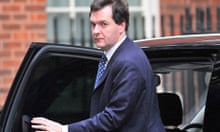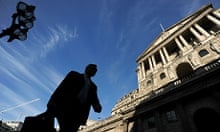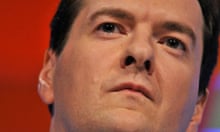It is now clear that plan A isn't working. Wave after wave of economic figures from HM Treasury, national and international economic institutions such as the OECD, the IFS and the IMF have all concluded that the British economy is faltering. The UK jobless total is now at its highest for more than 17 years, while growth has all but stalled.
We urge the government to adopt emergency and commonsense measures for a Plan B that can quickly save jobs and create new ones. A recovery plan could include reversing cuts to protect jobs in the public sector, directing quantitative easing to a green new deal to create thousands of new jobs, increasing benefits to put money into the pockets of those on lower and middle incomes and thus increase aggregate demand.
This could in part be paid for by the introduction of a financial transactions tax. The government could do far more to create the space for new and innovative industries and companies to flourish. One idea is a British investment bank, to leverage and back investment in low-carbon sectors such as housing, transport and renewable energy.
Doing nothing is not an option. We therefore call on the government to put the national interest first and hold an emergency budget that would instigate a Plan B for jobs, fairness and sustainability to rapidly get the economy moving again.
Dr Ha-Joon Chang, Faculty of Economics, University of Cambridge; Prof Sir Tony Atkinson, Nuffield College, Oxford; Howard Reed, Landman Economics; Chris Edwards, senior fellow, economics, University of East Anglia; Dr Mark G Hayes, fellow and director of studies in economics, Robinson College, Cambridge University; Prof Susan Himmelweit, professor of economics, Open University; Prof Mariana Mazzucato, chair in the economics of innovation, Open University; Prof Avner Offer, Chichele professor of economic history, University of Oxford, All Souls College; Dr Andrew Trigg, senior lecturer in economics, Open University; Dr David Hudson, senior lecturer in political economy, University College London; Prof Frances Stewart, Professor of development economics, University of Oxford; Dr Andrew Mearman, economics, UWE Bristol; Prof Ian Gough, professorial research fellow, LSE; Prof John Weeks, professor emeritus professor of economics, SOAS; Michael Burke, economist; Prof Peter Taylor-Gooby, University of Kent; Prof Diane Elson, University of Essex, chair UK Women's Budget Group; Prof Richard Smith, professor of econometric theory and economic statistics, University of Cambridge; Prof Rick van der Ploeg, professor of economics, University of Oxford; Robin Murray, senior visiting fellow, LSE; Prof Malcolm Sawyer, professor of economics, University of Leeds; Marina Della Giusta, senior lecturer in economics, University of Reading; Prof William Brown, Montague Burton professor of industrial relations, University of Cambridge; Prof Christine Cooper, Strathclyde University, co-editor of Critical Perspectives on Accounting; Prof Martin Parker, Warwick Business School, University of Warwick; Prof Simon Mohun, emeritus professor of political economy, Queen Mary, University of London; Dr Christopher Bowdler, university lecturer in Economics and Fellow of Oriel College, University of Oxford; Dr Diego Sanchez-Ancochea, university lecturer in the political economy of Latin America, University of Oxford; Alan Freeman, economist, London Metropolitan University; Dr Andy Denis, director of undergraduate studies, economics department, City University London; Dr Bruce Philp, Nottingham Business School, coordinator, association for heterodox economics; Dr Chris Fuller, Royal Docks Business School, University of East London; Dr Christian Kellerman, economist; Dr Jamie Gough, department of town and regional planning, University of Sheffield; Dr Jan-Emmanuel De Neve, lecturer in political economy and behavioural science, UCL; Dr Jonathan Perraton, University of Sheffield; Dr Michael Dietrich, department of economics, University of Sheffield; Dr Michael Gasiorek, senior lecturer in economics, University of Sussex; Dr Molly Scott Cato, reader in green economics, Cardiff Metropolitan University; Dr Ozlem Onaran, senior lecturer in economics, University of Westminster; Dr Paul Segal, lecturer in economics, University of Sussex; Dr Peter Holmes, reader in economics, Sussex University; Dr Peter North, senior lecturer, school for environmental sciences, University of Liverpool; Dr Pritam Singh, reader in economics, Oxford Brookes University; Dr Stephanie Blankenburg, department of economics and CISD (centre for international studies & diplomacy), SOAS; Prof Geoffrey Hodgson, research professor of business studies, University of Hertfordshire; Ismail Erturk, Manchester Business School; James Meadway, senior economist, nef; Prof Jan Toporowski, professor of economics and finance, chair of the economics department, SOAS, University of London; Prof Janet Newman, emeritus professor, The Open University; Jerome de Henau, lecturer in economics, Open University; Michael Edwards, senior lecturer in the economics of planning, UCL; Prof Michael Lipton FBA, professor of economics, University of Sussex; Prof George Irvin, SOAS, University of London; Prof Gregor Gall, director of the Work and Employment Research Unit (WERU), University of Hertfordshire; Prof Hugh Willmott, Cardiff Business School; Prof Malcolm Sawyer, Leeds University Business School; Prof Prem Sikka, Essex Business School; Prof Alan Hallsworth, Staffordshire University; Prof Andrew Dobson, Keele University; Prof David Bailey, Coventry University Business School; Prof Matthew Watson, University of Warwick; Prof Miguel Martinez Lucio, Manchester Business School, University of Manchester; Prof Paul Thompson, Strathclyde Business School; Prof Simon Lilley, head of University of Leicester School of Management; Prof Tony Thirlwall, Department of Economics, University of Kent; Richard Murphy, Director, Tax Research UK; Stewart Lansley, research fellow, Bristol University; Dr. Olivier Ratle, University of the West of England, Bristol; Roberto Veneziani, senior lecturer in Economics, QML; John Christensen, economic adviser and director, Tax Justice Network, London; Prof Machiko Nissanke, professor of economics, SOAS, University of London; Dr Pritam Singh, reader in economics, Oxford Brookes University; Prof Victoria Chick, emeritus professor of economics, UCL; Dr Sally Ruane, De Montfort University, Leicester; Kitty Ussher, associate, Demos; Prof Richard Grayson, Goldsmiths, University of London; Prof Stefano Harney, School of Business and Management, Queen Mary, University of London; Tony Greenham, nef; Gez Sagar, head of strategy, economy communications centre, HM Treasury (2009-2010); Dr Anastasia Nesvetailova, director, MA in global political economy, department of international politics, City University London; Andrew Simms, nef; Anna Coote, nef; Prof David Held, Graham Wallas professor of political science, LSE; Dr David Hall-Matthews, senior lecturer in international development, University of Leeds; Prof Danny Dorling, University of Sheffield; Prof Jonathan Rutherford, Middlesex University; Prof Mary Kaldor, LSE; Prof the Baroness Ruth Lister of Burtersett, Loughborough University; Valentino Piana, director, Economics Web Institute; Dr Heather Savigny, University of East Anglia; Dr Stuart White, Jesus College, University of Oxford; Prof Dave Byrne, Durham University; Prof Alan Finlayson, University of East Anglia; Prof Ken Spours, Institute of Education; Dr Martin O'Neill, lecturer in political philosophy, York University; Prof David Purdy; Prof Stuart Holland, faculty of economics, University of Coimbra (& former MP for Vauxhall); Tim Jenkins, nef; Victor Anderson, former economist for Sustainable Development Commission
I didn't choose to be arrested
Your account of my arrest is un-grounded and based on inaccurate speculation (Profile). Its entire analysis is based on an assumption that I had a choice about my arrest. The reason my partner's and my arrest is significant is that it shows that people are being taken off the street in America by the state for lawful activity that would not lead to their arrests.
The NYPD arrested us for standing peaceably on the sidewalk. I would never choose the fairly disturbing experience of being taken in handcuffs to a location that was intentionally concealed from our fellow protesters and our attorneys.
Naomi Wolf
New York
Foreign news is in good hands
The suggestion that greater use of local BBC journalists will affect the impartiality or quality of our foreign coverage simply does not stand up to scrutiny (Peter Preston).The World Service has been reporting for decades and in many languages from all corners of the globe. The vast majority of these overseas reporters are local nationals and have extensive experience of bravely reporting from some of the most dangerous and corrupt places in the world and always remaining impartial. It is these journalists who will be appearing more frequently on domestic news for the BBC. The BBC will be enriched by the diversity of voice and perspective and our audiences, domestic and global, will benefit from it.
Liliane Landor
Controller, languages
BBC Global News
London WC2
Don't tax us with unfair gibes
HM Revenue and Customs has taken quite a battering in recent months. The media (including The Observer, "Welcome to Britain, a haven for tax dodgers"), Parliament and pressure groups have variously accused HMRC of dishonesty, incompetence, secrecy and doing dodgy "sweetheart deals" with big business.
As chairman of HMRC, I feel that I should stand up publicly to defend the competence and integrity of my department. Last year, we brought in a record £486bn in tax revenue. Included in that was a record £13.9bn recovered from individuals and businesses who bent or broke the rules – more than twice as much as in 2005.
HMRC does not do "sweetheart deals" with big business. Our job is to get the tax that they owe. Since we can't talk about the details of these cases we are accused of unnecessary secrecy. The real culprits are those who hide funds in offshore accounts, cheat their VAT and falsify their accounts.
Mike Clasper
Chair, HMRC
London SW1A
William Keegan, we salute you
We were most disappointed by the news that William Keegan's column will henceforth appear in the Observer only fortnightly. A great virtue of your newspaper has been its willingness to support opinion that constructively challenges economic orthodoxy. Halving the regular analysis of your admired economics commentator is inconsistent with that noble tradition.
We must declare an interest: we, too, have challenged orthodoxy and some of the undersigned have been guest contributors to the column. William Keegan has provided his readers with a unique perspective on political economy for more than 30 years. It is a great pity that we will be seeing less of our old friend in your pages, when, in such times as these, we would like to see more.
Roger Bootle, Capital Economics; Stephen King, HSBC; John Llewellyn, Llewellyn Consulting; Gerard Lyons, Standard Chartered; David Marsh, Official Monetary and Financial Institutions Forum; Bill Martin, Centre for Business Research, Cambridge; Barry Moore, Downing College, Cambridge; Robert Rowthorn, emeritus professor of economics, Cambridge


